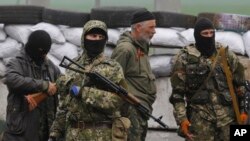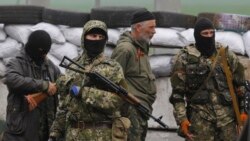The United States along with its G-7 partners, Canada, France, Germany, Italy, Japan, the United Kingdom, and the EU is deeply concerned over the continued efforts by separatists backed by Russia to destabilize eastern Ukraine.
Ukraine has taken steps to meet its commitments under the April 17 Geneva accord. These actions include working towards constitutional reform and decentralization, proposing an amnesty law for those who will peacefully leave the buildings they have seized in eastern Ukraine, and supporting the work of the Organization for Security and Cooperation in Europe. In addition, Ukraine has acted with restraint in dealing with the armed bands illegally occupying government buildings and forming illegal checkpoints.
In contrast, Russia has taken no concrete actions in support of the Geneva accord. It has not condemned the acts of pro-separatists seeking to destabilize Ukraine, nor called on armed militants to leave peacefully the government buildings they've occupied and put down their arms. Instead Russia has continued to escalate tensions with ongoing threatening military maneuvers on Ukraine's border.
The United States and its G-7 seven partners strongly condemn Russia's illegal annexation of Crimea and Sevastopol. The G-7 is now following through on consequences for this illegal annexation, including economic, trade, and financial areas.
The United States announced it is imposing sanctions on seven Russian government officials, including two members of President Vladimir Putin’s inner circle, who will be subject to an asset freeze and a U.S. visa ban, and 17 companies linked to Putin’s inner circle, which will be subject to an asset freeze. In addition, the Department of Commerce will deny or revoke some licenses granted to Russian companies seeking to export high technology defense equipment.
The international community has been unified in its position that Russia must cease its provocative actions in Ukraine. The United States remains prepared to impose still greater costs on Russia if the Russian leadership continues it provocative actions in Ukraine.
Ukraine has taken steps to meet its commitments under the April 17 Geneva accord. These actions include working towards constitutional reform and decentralization, proposing an amnesty law for those who will peacefully leave the buildings they have seized in eastern Ukraine, and supporting the work of the Organization for Security and Cooperation in Europe. In addition, Ukraine has acted with restraint in dealing with the armed bands illegally occupying government buildings and forming illegal checkpoints.
In contrast, Russia has taken no concrete actions in support of the Geneva accord. It has not condemned the acts of pro-separatists seeking to destabilize Ukraine, nor called on armed militants to leave peacefully the government buildings they've occupied and put down their arms. Instead Russia has continued to escalate tensions with ongoing threatening military maneuvers on Ukraine's border.
The United States and its G-7 seven partners strongly condemn Russia's illegal annexation of Crimea and Sevastopol. The G-7 is now following through on consequences for this illegal annexation, including economic, trade, and financial areas.
The United States announced it is imposing sanctions on seven Russian government officials, including two members of President Vladimir Putin’s inner circle, who will be subject to an asset freeze and a U.S. visa ban, and 17 companies linked to Putin’s inner circle, which will be subject to an asset freeze. In addition, the Department of Commerce will deny or revoke some licenses granted to Russian companies seeking to export high technology defense equipment.
The international community has been unified in its position that Russia must cease its provocative actions in Ukraine. The United States remains prepared to impose still greater costs on Russia if the Russian leadership continues it provocative actions in Ukraine.






